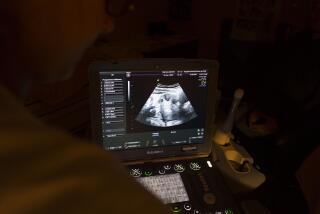Senate OKs Funds to Treat Breast, Cervical Cancer
- Share via
WASHINGTON — Uninsured women who rely on the government for breast or cervical cancer screening could get federally funded treatment under a bill approved Wednesday by the Senate.
The Breast and Cervical Treatment Act, passed by voice vote, gives states the option of providing Medicaid reimbursement for the treatments.
The bill returns to the House, which passed its version in May. Supporters hope for quick approval.
In a written statement, President Clinton said he would be “proud” to sign the measure and gave credit to his wife, Hillary, the Democratic U.S. Senate candidate from New York.
“Her long-standing advocacy for women with breast cancer is well known and has been the inspiration behind this administration’s unwavering commitment to this issue,” Clinton said.
The treatment would be tied to a program from the Centers for Disease Control and Prevention, approved in 1990, that has enabled nearly 800,000 women without health insurance to be screened for breast or cervical cancer. The federal government provides $3 for every $1 in state money for screening.
Lawmakers said it did not make sense for poor women to find out that they have cancer but cannot afford the treatment.
“In my view, diagnosing women with cancer but failing to treat them is cruel and tantamount to doing nothing at all,” said Sen. Lincoln Chafee (R-R.I.).
The women notified through the CDC program would qualify immediately to have all their treatment costs covered, officials said. The federal government and the states would share the cost, according to the bill.
“Screening alone--and the life and death knowledge about one’s health that comes as a result--cannot save a woman’s life,” said Sen. Olympia J. Snowe (R-Maine). “This legislation gives these women and all who have been screened through this program a fighting chance against this disease.”
The treatment would only be available to women who qualified for the CDC screening program. These women earn too much to be eligible for Medicaid but not enough to afford insurance, or work in jobs that do not provide health insurance, senators said.
The major difference between the House and the Senate bills is the amount of the federal match states would get.
The cost is estimated at $250 million over five years. Once passed by Congress and signed by the president, each state legislature must approve the bill.
More to Read
Sign up for Essential California
The most important California stories and recommendations in your inbox every morning.
You may occasionally receive promotional content from the Los Angeles Times.













